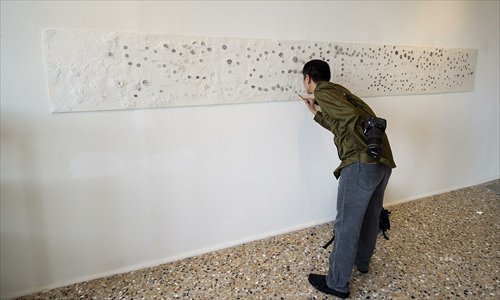Changing mindsets
Venice Biennale losing its luster in China as transparency increases

Chinese artist Qiu Zhijie adds some finishing touches ahead of the press preview of L'Unicorno e il Dragone - an exhibition part of the 55th International Art Exhibition on May 28, 2013 in Venice, Italy. Photo: CFP
As domestic artists have continued posting pictures of themselves in Venice on social media, people in China are becoming increasingly aware of the upcoming high profile art event set to take place in the Italian city. Similar to the previous years, a large group of Chinese artists will be exhibiting their works at the 56th Venice Biennale, with only four of them invited to take part in the Theme Pavilion exhibition and five of them showing off their works in the Chinese Pavilion.
Over 360 Chinese artists will swarm to the event's various peripheral exhibitions, or even take up space in the pavilions of other countries such as Kenya at no cost, a move that has been highly criticized in the past by people from these countries. In a striking contrast to the fevered excitement their fellow artists have about the biennale, domestic collectors and media have been stayed relatively calm so far, with fewer of the latter choosing to consistently shower the event with criticism or praise like previous years and the former attaching less importance to artists that have attended the event.
On one hand this underlines the fact that domestic collectors are finally getting over their long-time obsession with and admiration of the golden halo that attending the Venice Biennale used to give domestic artists, especially after 1999 when Cai Guoqiang became the first Chinese artist to win the Golden Lion Award at the event. On the other hand, this change also is a signal to Chinese artists that it's time to change their mentality. Attempts to earn recognition by edging their way into the biennale isn't as effective as it once was, which means true recognition must lie in the quality of their works.
Although the Venice Biennale is a time-honored event that has lasted more than a century, Chinese artists did not begin taking part in the event until the past two decades. Since China established its country pavilion at the event in 2005, an increasing number of artists began making the long journey to try and promote their works through this international platform. The number of Chinese artists showing up at the event as well as media attention reached a peak during the 55th Venice Biennale in 2013.
That year more than 300 Chinese artists took part in dozens of peripheral exhibitions, with some of them even holding their own solo-exhibitions connected to larger group exhibitions. The century-old event saw the highest amount of Chinese artists in its entire history, and "China fever" became a huge topic of discussion. However, behind this wave both domestic and foreign media questioned just how much money, instead of talent, was involved in getting these artists their opportunities to appear at the Biennale.
This is not the only controversy Chinese artists have experienced when it comes to the biennale. When news broke in early April that the majority of artists at this year's Kenyan Pavilion were actually Chinese it soon became a huge controversy with even the Kenyan government issuing an official protest and completely dissociating itself from the pavilion.
Although this is not the first time that Chinese artists have taken part in the Kenyan Pavilion, they first set this precedent in 2013. However, as more people in China have begun taking an interest in this large-scale event, it has become clear how these artists manage to attend the event is not as simple as people once thought.
The misgivings and criticism directed at the artists attending the Kenyan Pavilion has even reached the point where one of them felt the need to stand up and defend himself. Artist Shi Jinsong published an article on artron.net explaining that he accepted the invitation to the pavilion with the idea that "art should cross boundaries" and didn't give it much thought beyond that. It seems now though that his move to jump on board without looking into the matter has hurt more than helped his reputation.
It's been 10 years since China officially joined the Venice Biennale. Over this past decade, domestic collectors, especially those belonging to the younger generation, have developed increasingly sharp insight into the event. Many of them now have the ability to penetrate the biennale's complicated organization and its multitude of parallel exhibitions to see the commercial nature that many of these exhibits possess. As such adding "attended the Venice Biennale" to an artist's resume no longer carries the prestige and power of yesteryear, which means domestic artists will no longer be able to increase the value of their works by bundling them together with some fancy international brand name.